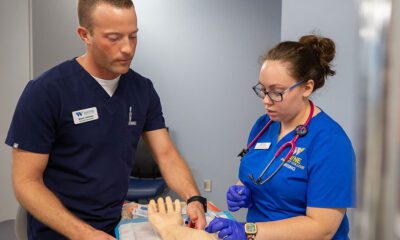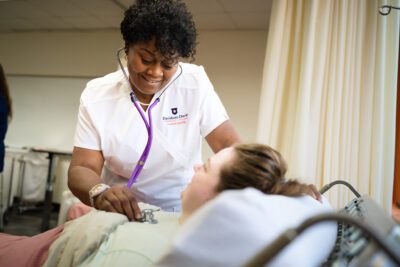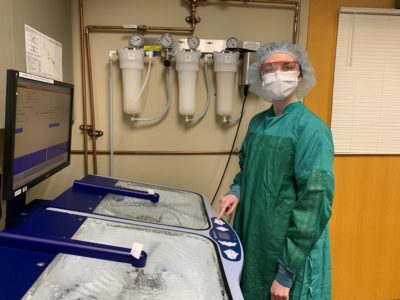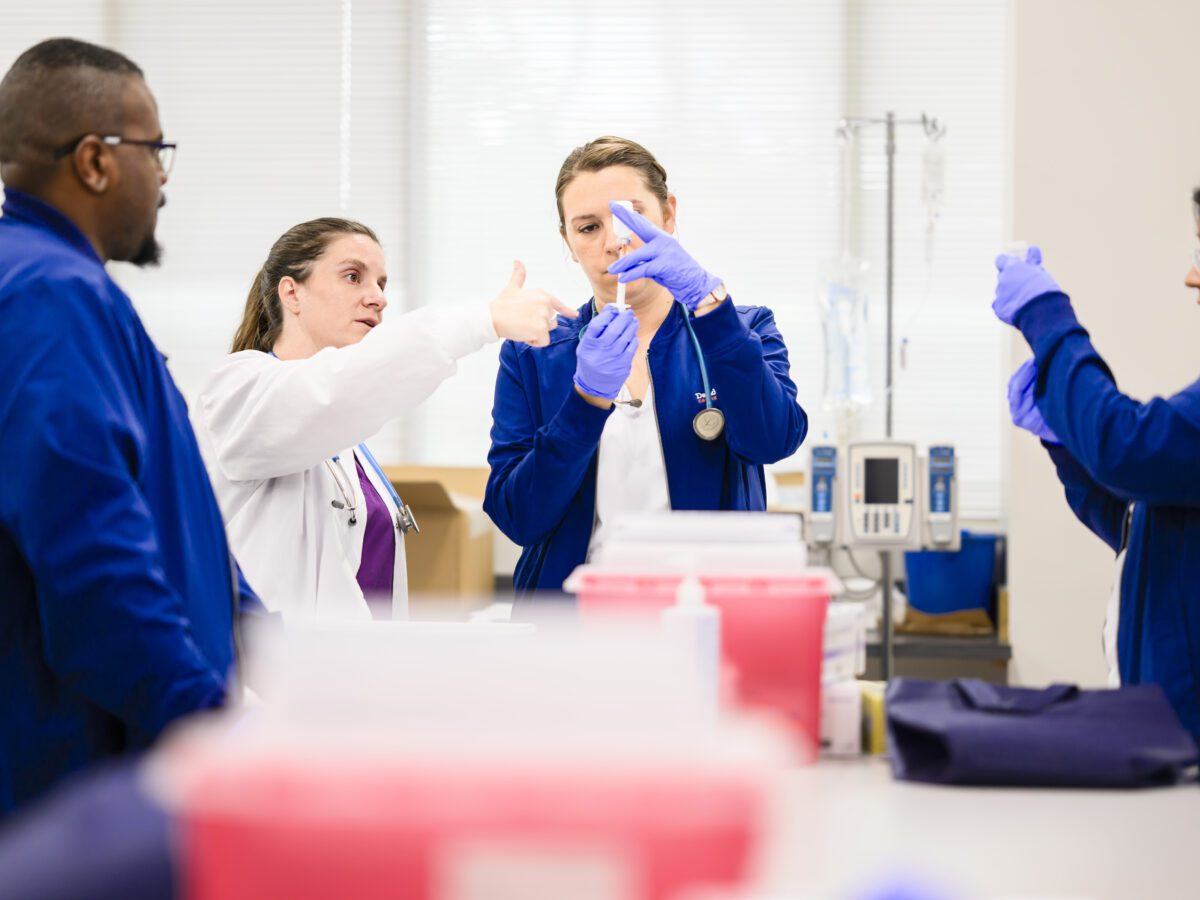

|
|
“It’s not Grey’s Anatomy. It is very real,” said Casey Castrianni, graduate of the inaugural nursing apprenticeship cohort at Davidson-Davie Community College (Davidson-Davie).
A partnership between Davidson-Davie and Atrium Health Wake Forest Baptist, the program is the first registered nursing apprenticeship program in North Carolina.
As one of five registered nurse (RN) apprenticeship graduates, Castrianni said receiving on-the-job training while attending school was a chance to experience the role she would step into after completing her program. It also provided invaluable hands-on experience that she wouldn’t have gained elsewhere.
“This program helped me immensely with becoming a nurse, the nurse I am today, because I was able to work in acute care,” she said.
The nursing apprenticeship let Castrianni and her fellow apprentices experience what being a nurse is like in real life with real scenarios and real patients — an experience that cannot be gained from a textbook. And while clinical instruction is critical, simulations cannot always prepare a student for what they may encounter as an RN.
“Sometimes it looks like holding the hand of somebody who is dying because their families aren’t aware of what’s going on and they’re not answering their phones,” Castrianni said.
While it’s not always easy, the apprentices said the program is a chance to experience what it’s like to be an RN firsthand and be paid for it.
Castrianni is one of the first to graduate from the nursing apprenticeship program and now serves as a mentor. She hopes to one day become a clinical nursing instructor.
Launching a nursing apprenticeship program
Apprenticeships are nothing new – centuries old in fact. In recent years, however, apprenticeships in North Carolina have expanded. As of Dec. 2023, ApprenticeshipNC reported over 9,100 active apprentices and nearly 1,400 active registered apprenticeship programs.
With proven success in other industries, Davidson-Davie and Atrium Health Wake Forest Baptist knew a nursing apprenticeship model could be a path forward to addressing current and future nursing shortages.
Experts predict North Carolina will see nursing shortages over the next decade. By 2033, the state could face a shortage of roughly 12,500 registered nurses (RNs) and over 5,000 licensed practical nurses (LPNs).
What started as a “what if” conversation quickly led to a collaborative effort that is now considered the largest health care apprenticeship in North Carolina.
Working together with ApprenticeshipNC, Davidson-Davie and Atrium Health launched a nursing apprenticeship program that allows nursing students the opportunity to receive on-the-job training while earning a paycheck and going to school.
How the program works
The program has two pathways: licensed practical nurse (LPN) to associate degree nursing (ADN) or nurse aide to ADN.
Both pathways allow students to work toward their associate degree in nursing while receiving a paycheck, on-the-job training, and mentorship working as either nurse aides or licensed practical nurses. Apprentices are placed on medical surgical floors where they encounter a variety of health care scenarios.
The LPN to ADN pathway is an accelerated program, reducing program time from 36 months to 24 months. Apprentices spend the first year of the program working full-time before transitioning to part-time work while completing ADN coursework and clinical requirements.
Below is a step-by-step process of how the nursing apprenticeship model works in practice.
Benefits and results
Apprenticeship programs benefit all involved – students, employers, academic institutions, and the community.
For students, it’s hands-on experience while earning a paycheck in the field they’ll soon enter.
For employers, the apprenticeship program is a workforce pipeline and a chance to build trust with future RNs. One of the goals of the program is to retain students once they graduate with their associate degree in nursing, placing them as RNs in the same hospital where they completed their apprenticeship.
Academic institutions are engaging with employers to fill a critical need in their community. Since apprentices often work and attend school in the communities where they live, the need for travel nurses is potentially reduced.
And finally, it benefits the community because not only is it generating a more stable health care infrastructure, it’s also creating a health care system of professionals who are living where they work.
“It’s a workforce that looks like the community they are serving.”
Dr. Susan Burleson, executive vice president, academic and student affairs, Davidson-Davie Community College
The first nursing apprenticeship cohort started fall 2021 with four students.
As of fall 2023, the program has admitted 11 apprentices. Of those, five have graduated as RNs, three did not complete the program, and three are currently completing their apprenticeships.
Of the five who graduated, four are employed in the Atrium Health Wake Forest Baptist system and one is employed at Novant.
The program expects to enroll seven apprentices in fall 2024. Apprenticeship admittance is based on vacant positions at Lexington Medical Center and Davie Medical Center – two facilities within Atrium Health Wake Forest Baptist.
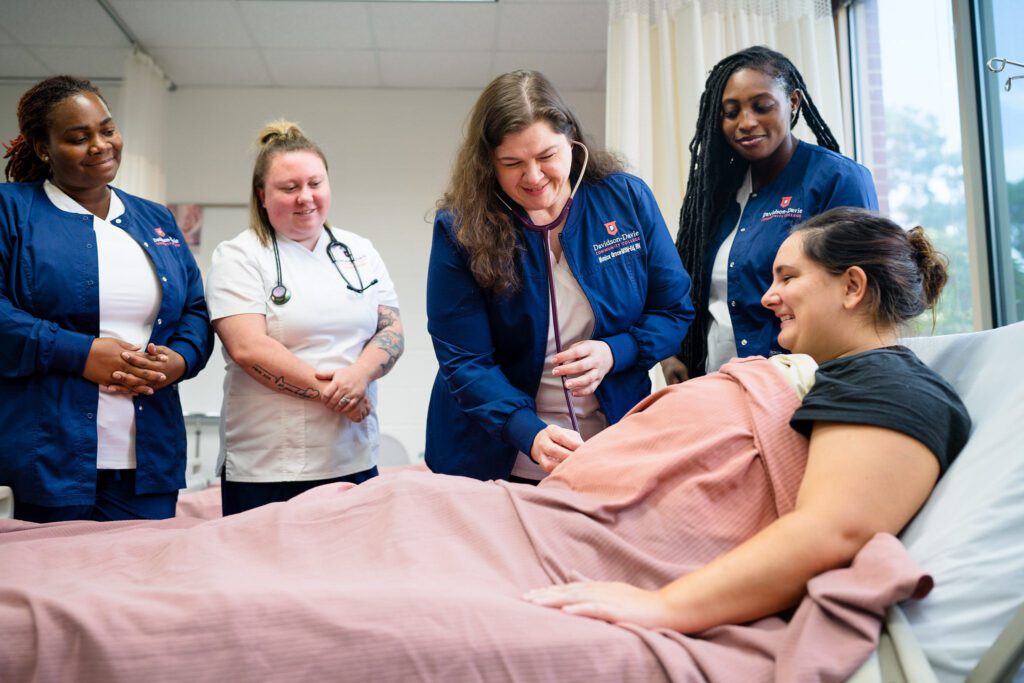

Taking it a step further
After launching the nursing apprenticeship program in 2020, Davidson-Davie and Atrium Health used it as the foundation to launch eight additional health care apprenticeships.
According to the U.S. Department of Labor, “Employment in health care is projected to grow faster than the average for all occupations through 2032 with 1.8 million openings per year.”
But the growing demand is quickly outpacing the ability to fill positions because of talent shortages, burnout among health care workers, and increasing skill demands.
Davidson-Davie and Atrium Health recognized that the apprenticeship model could work just as well for other health care jobs, including pharmacy tech, paramedic, surgical tech, and more.
Replicating the nursing apprenticeship model
To provide a better understanding of the nursing apprenticeship model and how communities can replicate it, we’ve written an in-depth case study that includes a quick guide for launching the model.
What’s in the case study:
- Key elements of the nursing apprenticeship model
- Funding
- Results
- Benefits
- Lessons learned from Davidson-Davie and Atrium Health
- Recommendations based on lessons learned
- Appendices, which include a quick guide to launching, resources, and sample documents
For more information, please contact Emily Thomas at ethomas@ednc.org
Behind the Story
The nursing apprenticeship case study was informed by the following interviews:
- Davidson-Davie Community College representatives, including apprentices
- Atrium Health Wake Forest Baptist representatives
- ApprenticeshipNC representatives
Support for this case study was provided by the Blue Cross and Blue Shield of North Carolina Foundation as part of their commitment to profile and strengthen approaches to supporting the state’s health care workforce.
EdNC would like to extend a special thank you to Dr. Holly Myers, Davidson-Davie’s dean of health sciences, for her assistance with the development of resources and sample documents.



